- Gallos finos
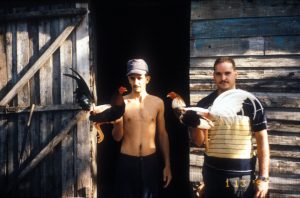 Read more
Read moreIn January 1997, if I was astonished to discover the pervasiveness (and popularity) of cockfighting on the island, I was even more stunned by the prestige that Cubans who raise these birds for that purpose enjoyed in rural communities. Engaging ...
- “No Cubans, No Fence”
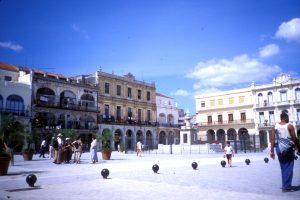 Read more
Read moreBy the early 2000s, progress on the relocation of residents paralleled the radical facelift and restoration of building interiors on the Plaza Vieja. German financing produced Cuba’s first craft brewery. The old post office, remembered as one of the “only ...
- Plaza Vieja
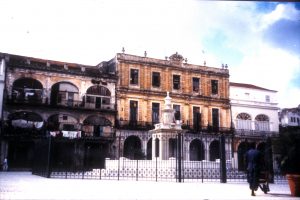 Read more
Read moreLike much of Cuba’s old and ruined colonial relics, Old Havana’s Plaza Vieja, literally meaning “Old Plaza”, underwent restorations ordered by UNESCO-backed Cuban government agencies, beginning in the late 1990s. Residents who had spent decades dealing with collapsing ceilings and ...
- Urban pig
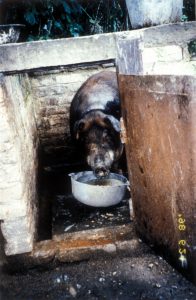 Read more
Read moreLike most cities, Havana’s municipal government had prohibited the raising of livestock within city limits for decades at the time of the Cuban Revolution of 1959. However, in the Special Period, the despair of citizens over the unavailability of virtually ...
- El Seminario San Carlos
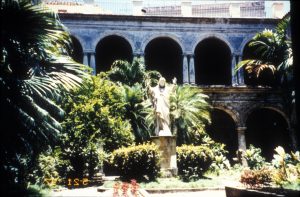 Read more
Read moreFounded in 1689 and completed in the early 1700s under the direction of the Jesuit order, the seminary, when I first visited, served not only as a church office for the Bishopric but was still a functioning Jesuit seminar for ...
- Blind street musician on Obispo Street, Old Havana – 1997
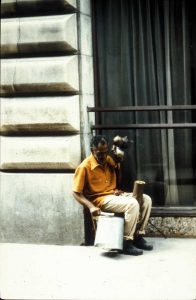 Read more
Read moreAlthough begging for money and performing for it on the street was illegal since the adoption of Communism and, assumedly, the elimination of need in 1961, both beggars and street performers returned visibly in the 1990s across Cuba’s cities. Unable ...
- Tobacco field near the political prisoners’ colony of Briones Montoto – 1998
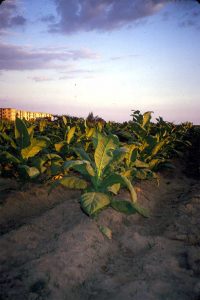 Read more
Read moreA gorgeous tobacco plant awaits harvest near a town for peasants who rebelled against Communist laws to control crop production and seize lands during a five-year long civil war in the Escambray highlands of central Cuba from 1961-1966. Utterly unknown ...
- La vega de Pucho (Pucho’s field) – 1996
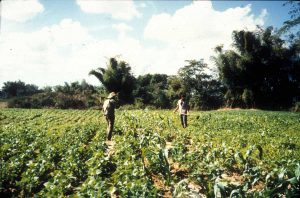 Read more
Read moreWorking side-by-side with his son-in-law Felipe on a scant two acres of land the government granted them after state farms failed in the Special Period, Pucho grew everything from black beans and corn to tomatoes and onions for his family ...
- Uncle Pucho – 1996
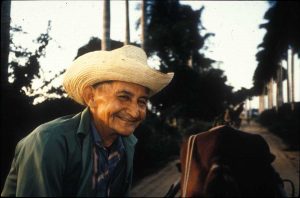 Read more
Read moreMy father’s brother Pucho returned to subsistence farming full time in 1991 after government-owned farms began closing one by one in the wake of disappearing Soviet aid and subsidies. Like his horse (who lost twenty pounds in less than a ...
- Pig roast – December 1996
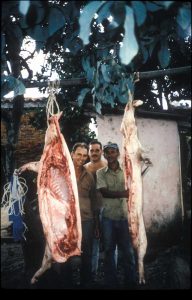 Read more
Read moreHere my uncle Tiki Guerra stands with his wife’s nephew Luis, and Mingo, a long-time friend and former small farmer whose land once bordered my grandparents in Marcos Vásquez, Pinar del Río. They pose with the recently slaughtered pig that ...
- Timbiriche – January 2000
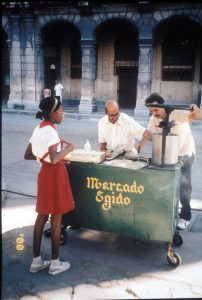 Read more
Read moreLike the small family-owned restaurant, the re-legalization of timbiriches (street snack stalls) in 1992 for the first time since 1968 sparked a highly visible restoration and revival of many of the same businesses by the very same people who had ...
- Paladar – January 1997
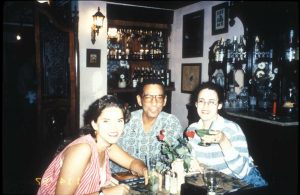 Read more
Read moreLocated in the former coach house of a giant mansion on Old Havana’s Plaza of the Cathedral, this tiny twelve-seat restaurant opened under family management thanks to the early reforms of 1991-1992 that allowed small businesses to operate for the ...
- Marabú – June 1997
 Read more
Read moreThree hundred years ago, Cuba’s Spanish colonizers deliberately planted a kind of acacia typical of arid regions of Spain along riverbanks: they acted on the arrogant assumption that doing so would prevent rivers from overflowing their banks during Caribbean hurricanes. ...
- Uncle Tiki’s shoes – February 1997
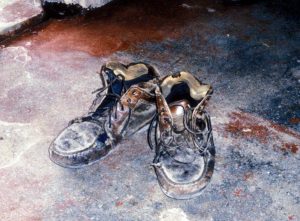 Read more
Read moreWhen I first visited my vast extended family in the provinces of western Cuba in the mid-1990s, it was obvious that the wrenching austerity with which they had lived was not simply a product of the Special Period or the ...
- Evidence of a peasant’s hard life – December 1996
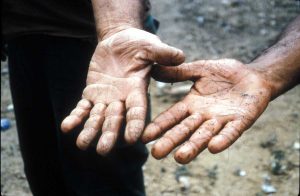 Read more
Read moreWhen I first met my father’s younger brother José Antonio “Tiki” Guerra in the fall of 1997, he had spent most of his life attempting to sustain the small farm that his parents had founded in the 1940s. While a ...
- Illegal artisanal jewelry vending to tourists at Varadero Beach – December 1996
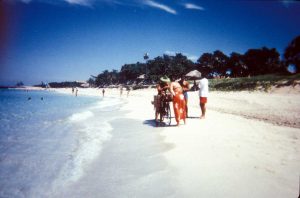 Read more
Read moreBetween 2007 and 2018, Raúl Castro temporarily expanded the number of categories and marketing reach of licenses for Cubans to operate small businesses such as the home manufacture of artisanal goods for tourists and their sale by middle men. However, ...
- Building collapse – March 1997
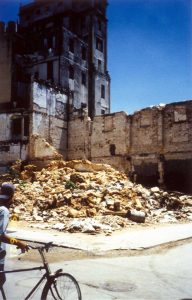 Read more
Read moreIn the early spring of 1997, this building collapsed just seconds after historian Dr. Manuel Barcia passed it while biking to the National Archive of Cuba. It was located on the corner of Obispo Street, the principal pedestrian-only thoroughfare connecting ...
- Couple on a Chinese bike – January 1997
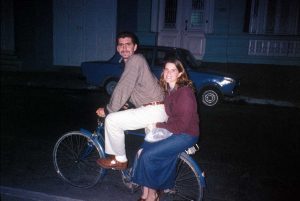 Read more
Read moreBecause Cubans found Chinese bikes expensive, many families took to sharing their bike in a startling way: by placing a long sponge poached from old furniture cushions on the grill over the bike’s tire so a lighter member of the ...
- Clear-cutting in Cuba’s “protected” national forests – July 1997
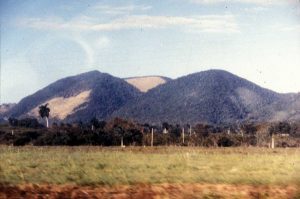 Read more
Read moreFrequently celebrated abroad for its alleged commitment to preserving bio-diversity, the Cuban government’s actual history of environmental-policy-making-by-whim or simple resource extraction for sale to undisclosed foreign buyers without public accountability is little known. For peasants in affected areas, memories of ...
- Illegal garlic vending on the autopista to Pinar del Rio – April 1997
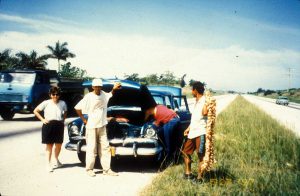 Read more
Read moreAlthough the package of economic reforms launched in 1992 included the legalization of a non-state-owned, private sector of small businesses, laws limited licensing to a highly limited number of categories. In order to monopolize profits from both tourists and citizens, ...
- Bicicleta china (Chinese bicycle) – June 1995
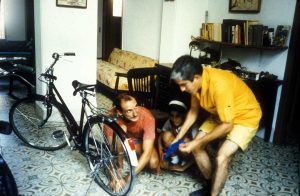 Read more
Read moreWith the dissolution of the Soviet Union in late December 1991, Cuba’s previously privileged pricing and supply guarantees of Soviet oil also disappeared. For the next several years, public transportation ceased to exist throughout the island. Not only could workers ...
- Arenas Doradas (Golden Sands) – December 1996
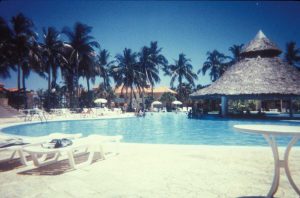 Read more
Read moreWith the collapse of the Soviet Union and its annual subsidy of $4.4 billion to Cuba’s economy in 1991, Fidel Castro and fellow Communists suddenly reversed their condemnation of foreign capitalist investors and luxury tourism to embrace both. The Communist ...